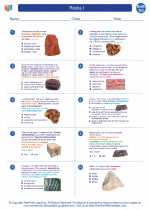Acid-Base Reaction
An acid-base reaction is a chemical process that involves the transfer of protons (H+) from an acid to a base. This reaction results in the formation of water and a salt. Acids are substances that can donate protons, while bases are substances that can accept protons. When an acid and a base react, the acid donates a proton to the base, forming water and a salt.
Characteristics of Acids and Bases
- Acids: Sour taste, turn blue litmus paper red, and can conduct electricity.
- Bases: Bitter taste, feel slippery, turn red litmus paper blue, and can also conduct electricity.
Types of Acid-Base Reactions
There are several types of acid-base reactions, including:
- Neutralization Reaction: When an acid reacts with a base to form water and a salt.
- Proton Transfer Reaction: Involves the transfer of protons from an acid to a base.
- Hydrolysis Reaction: When a salt reacts with water to form an acid and a base.
Study Guide
Here are some key points to remember when studying acid-base reactions:
- Understand the properties of acids and bases, including their taste, behavior with litmus paper, and ability to conduct electricity.
- Learn to identify common acids and bases and their chemical formulas.
- Recognize the different types of acid-base reactions and be able to write balanced chemical equations for these reactions.
- Practice calculating the pH of acidic and basic solutions using the pH scale.
- Understand the concept of neutralization and its importance in various industrial and biological processes.
By mastering the concepts and principles of acid-base reactions, you will be able to understand a wide range of chemical processes and their applications in various fields.
[Acid-base Reaction] Related Worksheets and Study Guides:
.◂Earth Science Worksheets and Study Guides High School. Rocks I
Worksheet/Answer key Rocks I
Rocks I  Worksheet/Answer key
Worksheet/Answer key Rocks I
Rocks I  Worksheet/Answer key
Worksheet/Answer key Rocks I
Rocks I  Vocabulary/Answer key
Vocabulary/Answer key Rocks I
Rocks I  Vocabulary/Answer key
Vocabulary/Answer key Rocks I
Rocks I  Vocabulary/Answer key
Vocabulary/Answer key Rocks I
Rocks I 

 Worksheet/Answer key
Worksheet/Answer key
 Worksheet/Answer key
Worksheet/Answer key
 Vocabulary/Answer key
Vocabulary/Answer key
 Vocabulary/Answer key
Vocabulary/Answer key
 Vocabulary/Answer key
Vocabulary/Answer key

The resources above cover the following skills:
EARTH AND SPACE SCIENCE
Earth’s Systems
Construct an explanation from evidence for the processes that generate the transformation of rocks in Earth’s crust, including chemical composition of minerals and characteristics of sedimentary, igneous, and metamorphic rocks.
ENVIRONMENTAL SCIENCE
Earth and Human Activity
Engage in argument from evidence to defend how coastal, marine, and freshwater sources (e.g., estuaries, marshes, tidal pools, wetlands, beaches, inlets, rivers, lakes, oceans, coral reefs) support biodiversity, economic stability, and human recreation.